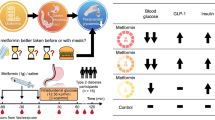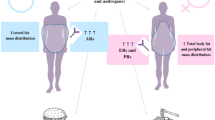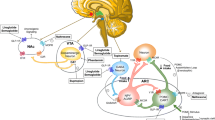Abstract
Background
Roux-en-Y gastric bypass surgery (RYGB) is an effective treatment for morbid obesity. Increased alcohol abuse after RYGB resulted in recommendations to exclude patients with alcohol abuse histories from RYGB. The purpose of our study was to examine the effects of a RYGB on ethanol intake in diet-induced obese rats (high-fat diet).
Methods
The animals underwent RYGB and were habituated along with their sham-operated obese controls and with lean rats to increasing concentrations of ethanol in a two-bottle choice paradigm.
Results
RYGB rats' daily consumption of ethanol averaged 2 g/kg at 2 % habituation and 3.8 g/kg at 4 % habituation, twice as much as sham-operated obese controls and 50 % more than normal-diet lean controls. Obese controls drank on average 1 g/kg of ethanol (2 and 4 %), significantly less (50 %) than lean controls did. RYGB rats when given higher ethanol concentrations (6 and 8 %) or no ethanol drank significantly more water than lean and obese controls did (66 and 100 %, respectively), and their enhanced total fluid intake was associated with increased food intake, which was significantly higher than in lean (66 % more calories; food + alcohol) and obese controls (44 % more calories). The lower alcohol intake in the obese controls than in the lean rats suggests that obesity may interfere with alcohol's rewarding effects and RYGB may remove this protective effect.
Conclusions
The overall enhancement of consummatory behaviors (both ethanol and water) suggests that RYGB may facilitate alcohol consumption, which in vulnerable individuals could lead to abuse and addiction.




Similar content being viewed by others
References
Andrés M, et al. Roux-en-Y gastric bypass: major complications. Abdom Imaging. 2007;32(5):613–8.
Sugerman H, et al. Gastric bypass for treating severe obesity. Am J Clin Nutr. 1992;55(2):560S–566.
Marcus MD, Kalarchian MA, Courcoulas AP. Psychiatric evaluation and follow-up of bariatric surgery patients. Am J Psychiatry. 2009;166(3):285–91.
Ochner CN, et al. The neurohormonal regulation of energy intake in relation to bariatric surgery for obesity. Physiol Behav. 2010;100(5):549–59.
Steele K, et al. Alterations of central dopamine receptors before and after gastric bypass surgery. Obes Surg. 2010;20(3):369–74.
Dunn JP, et al. Decreased dopamine type 2 receptor availability after bariatric surgery: preliminary findings. Brain Res. 2010;1350:123–30.
Ertelt TW, et al. Alcohol abuse and dependence before and after bariatric surgery: a review of the literature and report of a new data set. Surg Obes Relat Dis. 2010;4(5):647–50.
Dutta S, et al. Methamphetamine use following bariatric surgery in an adolescent. Obes Surg. 2006;16(6):780–2.
Segal A, Kinoshita D. Kussunoki, and M. Aparecida Larino, Post-surgical refusal to eat: anorexia nervosa, bulimia nervosa or a new eating disorder? A Case Series. Obes Surg. 2004;14(3):353–60.
Mottin C, et al. Histological behavior of hepatic steatosis in morbidly obese patients after weight loss induced by bariatric surgery. Obes Surg. 2005;15(6):788–93.
Klockhoff H, Naslund I, Jones AW. Faster absorption of ethanol and higher peak concentration in women after gastric bypass surgery. Br J Clin Pharmacol. 2002;54:587–91.
Hagedorn JC, et al. Does gastric bypass alter alcohol metabolism? Surg Obes Relat Dis. 2007;3(5):543–8.
Hajnal A, et al. Gastric bypass surgery alters behavioral and neural taste functions for sweet taste in obese rats. Am J Physiol Gastrointest Liver Physiol. 2010;299(4):G967–79.
Gustafsson L, Ploj K, Nylander I. Effects of maternal separation on voluntary ethanol intake and brain peptide systems in female Wistar rats. Pharmacol Biochem Behav. 2005;81(3):506–16.
Ploj K, Roman E, Nylander I. Long-term effects of maternal separation on ethanol intake and brain opioid and dopamine receptors in male Wistar rats. Neuroscience. 2003;121(3):787–99.
Spanagel R, Hölter SM. Long-term alcohol self-administration with repeated alcohol deprivation phases: an animal model of alcoholism? Alcohol Alcohol. 1999;34(2):231–43.
Siegmund S, et al. Influence of age at drinking onset on long-term ethanol self-administration with deprivation and stress phases. Alcohol Clin Exp Res. 2005;29(7):1139–45.
Carrillo CA, et al. A high-fat meal or injection of lipids stimulates ethanol intake. Alcohol. 2004;34(2–3):197–202.
Prasad A, Abadie JM, Prasad C. Can dietary macronutrient preference profile serve as a predictor of voluntary alcohol consumption? Alcohol. 1993;10(6):485–9.
Stylopoulos N, Hoppin AG, Kaplan LM. Roux-en-Y gastric bypass enhances energy expenditure and extends lifespan in diet-induced obese rats. Obesity. 2009;17(10):1839–47.
Xu Y, et al. Gastric bypass model in the obese rat to study metabolic mechanisms of weight loss. J Surg Res. 2002;107(1):56–63.
Odom J, et al. Behavioral predictors of weight regain after bariatric surgery. Obes Surg. 2010;20(3):349–56.
Kalarchian M, et al. Binge eating among gastric bypass patients at long-term follow-up. Obes Surg. 2002;12(2):270–5.
Kumar R, et al. Fat malabsorption and increased intestinal oxalate absorption are common after Roux-en-Y gastric bypass surgery. Surgery. 2011;149(5):654–61.
Seyfried F, le Roux CW, Bueter M. Lessons learned from gastric bypass operations in rats. Obes Facts. 2011;4 Suppl 1:3–12.
Woodard GA, et al. Impaired alcohol metabolism after gastric bypass surgery: a case-crossover trial. J Am Coll Surg. 2011;212(2):209–14.
Jerlhag E, et al. Requirement of central ghrelin signaling for alcohol reward. Proc Natl Acad Sci. 2009;106(27):11318–23.
Briggs DI, et al. Diet-induced obesity causes ghrelin resistance in arcuate NPY/AgRP neurons. Endocrinology. 2010;151(10):4745–55.
Cummings DE, et al. Plasma ghrelin levels after diet-induced weight loss or gastric bypass surgery. N Engl J Med. 2002;346(21):1623–30.
Pournaras DJ, le Roux CW. Ghrelin and metabolic surgery. Int J Peptides. 2010;2010:5.
Faraj M, et al. Plasma acylation-stimulating protein, adiponectin, leptin, and ghrelin before and after weight loss induced by gastric bypass surgery in morbidly obese subjects. J Clin Endocrinol Metab. 2003;88(4):1594–602.
Volkow ND, Wang G-J, Baler RD. Reward, dopamine and the control of food intake: implications for obesity. Trends Cogn Sci. 2011;15(1):37–46.
Boileau I, et al. Alcohol promotes dopamine release in the human nucleus accumbens. Synapse. 2003;49(4):226–31.
Acknowledgments
This work was supported by the NIAAA (AA 11034 & AA07574, AA07611) DK080899 (AH).
We thank the SULI program for partial support of Mike Subrize. We also thank Nikhil K. Acharya, Robert Bellezza, and Michael Miller for their help with the care of the animals.
Conflict of Interest
Panayotis K. Thanos, Ph.D., Mike Subrize, B.S., Foteini Delis, Ph.D., Robert N. Cooney, M.D., Derek Culnan, M.D., Mingjie Sun, Ph.D., Gene-Jack Wang, M.D., Nora D. Volkow, M.D., and Andras Hajnal, M.D., Ph.D., do not have any conflict of interest to disclose.
Author information
Authors and Affiliations
Corresponding author
Rights and permissions
About this article
Cite this article
Thanos, P.K., Subrize, M., Delis, F. et al. Gastric Bypass Increases Ethanol and Water Consumption in Diet-Induced Obese Rats. OBES SURG 22, 1884–1892 (2012). https://doi.org/10.1007/s11695-012-0749-2
Published:
Issue Date:
DOI: https://doi.org/10.1007/s11695-012-0749-2




